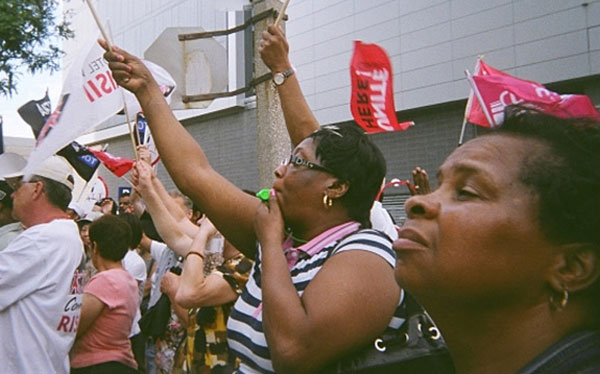In an era of relentless outsourcing and widespread anti-union sentiment among employers, labour victories are few and far between. Certainly, when the Canadian Autoworkers and the Communications Energy Paperworkers merged to become Unifor last fall, the leadership of both unions felt that they needed more heft to advance a more labour-friendly political agenda.
In “State of the Unions,” my December 2013 feature for The Walrus, I documented not just the high-level amalgamation of Canada’s two most powerful labour organizations; the story also looked at the activities of UNITE HERE, a scrappy international union that represents the thousands of low-paid, predominantly immigrant and visible minority workers who staff restaurants, hotels, and casinos in our big cities.
Last year, UNITE HERE Local 75, which is based in Greater Toronto, launched a nervy, high-profile campaign against Richtree Market (formerly Mövenpick), a lunch emporium with a busy outlet in the city’s Eaton Centre. A year ago, the company closed the location, laid off almost fifty employees (including many long-serving staff), and announced plans to relocate within the shopping mall.
According to the company, the new address—which opened last September—represented a new business, and therefore didn’t need to adhere to the collective agreement with UNITE HERE. That deal guaranteed the workers “successor rights,” meaning they had to be rehired if the restaurant changed hands but remained substantially the same workplace.
After a sustained public pressure campaign against Richtree, which featured numerous demonstrations and pickets in and around Canada’s busiest mall, the Ontario Labour Relations Board last week ruled that the company couldn’t simply break the union by changing locations. The decision means UNITE HERE maintains bargaining rights to represent Richtree employees in the new location.
Local 75 president Lis Pimentel says the move would have been “a very damaging precedent for unions in general if the company had succeeded. If there were no successor rights, it would be a very easy way [for companies] to get rid of unions.” Consequently, she adds, UNITE HERE and the forty-some employees at the Eaton Centre Richtree location had considerable support as they waged this protracted battle. “The entire labour movement has gotten behind this,” adds Pimentel.
The union’s strategy entering the fight with Richtree, the beginnings of which I described in my feature, involved both a legal front and a hearts-and-minds campaign. Using regular pickets and outreach to journalists, UNITE HERE organizers made sure to keep the Richtree fight in the public eye. “We wanted to make sure the employer knows we are absolutely committed to achieving justice,” says Pimentel.
The OLRB ruling, however, isn’t the end of this story. UNITE HERE officials now need to negotiate with the company to resolve the status of the employees laid off last year. Under the collective agreement, they should have been offered specified severance packages or been given the right to have their names placed on a layoff list, so they could be rehired when the new location opened. Pimentel says the union also needs to negotiate a new collective agreement with Richtree.
Pimentel notes that some of the workers who’d been let go have had difficulty finding new work because of their age, so she wants her negotiators to work with Richtree to find those individuals jobs in the new location, which is much larger.
The story is noteworthy because it reveals how a media-savvy union with an outspoken membership and a gutsy legal team held its ground in the face of relentless pressure to boost profits by chipping away at the salaries and benefits of some of society’s most poorly paid workers.
Something to ponder the next time you grab that coffee-and-muffin special on the way to the office.





